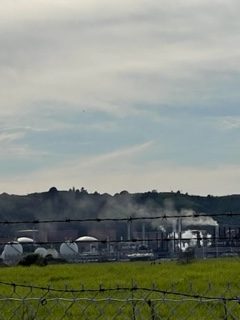Will Contra Costa County Ever Be Fossil Fuel Free?

Courtesy of Brenda Maldonado
Contra Costa County is home to one of the largest oil refineries in California, which is only a couple miles away from residents’ backyards.
The Chevron Refinery in Richmond has been the one of biggest contributors in polluting the nearby communities’ air, causing big numbers in chronic respiratory issues among residents there, according to researchers. In 2012, a fire was caused by an oil leak at the refinery that spread a cloud of toxic chemicals out in the nearby communities. According to Contra Costa County health records, this incident sent over 15,000 residents to the hospital due to experiencing respiratory issue symptoms.
Respiratory issues such as asthma have a rate in Richmond that is nearly twice the state’s average rate. The prevalence of asthma in California is approximately 13%, but in Richmond it approaches 25%, according to the Richmond Environment and Asthma Community Health (REACH) Study.
“Diesel particular matter emissions are higher in Richmond than in other neighboring cities in West Contra Costa County.” stated a CCC health record. With all these pollutants spreading across the community’s air, it’s no surprise that the county has big numbers in respiratory issues among residents.
These factors prompt many environmental activists and residents to wonder, will there ever be a change to the environmental injustices that the community has been facing for years?
Contra Costa College Philosophy Professor Micheal Kilivris opened up his classroom recently to three guest speakers who fight for environmental justice in the community to discuss that question.
The group included Marisol Cantu, a professor at CCC and a longtime fighter for environmental justice who is working with the Richmond Progressive Alliance, Alfredo Angulo, the program coordinator for the Richmond Shoreline Alliance and a CCC alum, John Gioia, a member of the Contra Costa County Board of Supervisors who represents the district where Richmond is located. They brought up other ways in which West Contra Costa County communities are exposed to toxic harmful materials and how people in the area are working on getting to the right path infighting these environmental injustices.
Richmond and San Pablo are both very diverse communities, with their populations mostly composed of people of color. According to the 2022 census, 43.8% of people in these areas are Hispanic or Latino, 18.4% African American, and 14.5% Asian. So why is it that communities with people of color are those being most affected by the harms of environmental injustices?
“I think it’s kind of a mix of legacy environmental injustices and new environmental injustices, the city of Richmond has been a really industrial town. The refinery was one of the first developments here in Richmond, so when you mix that kind of development in industry and things like racist government such as redlining, people making powerful decisions result in pinpointing communities with people of color next to industrial zones,” stated Angulo.
It was also mentioned that transportation around the Bay Area plays a role in polluting nearby communities such as gas-fueled cars, trucks, ships, and trains.
“Recently, the city of Richmond passed the law to phase out the processing of coal and the shipping of coal,” Gioia said.
With the community heading towards the right path in stopping pollution in the air and other environmental injustices there is still a long way to go to create a fully non-fossil fuel zone.
While transitioning away from fossil fuels completely is ideal, there are challenges that will impact the community from the shift. The Chevron Refinery is the biggest employer in the area, employing 1,200 workers, if the refinery closes what would happen to those employees. Back in 2020, the Marathon Martinez oil refinery was shut down and hundreds of workers lost their jobs. KQED talked about the impact on the workers from the marathon refinery closing. In the article, it mentions how the environmentalist felt about the closure of the refinery and the workers that had just lost their job. They mentioned the term “just transition” to justify a fair transition for both the communities and the economy toward creating a fossil-free zone.
There is also the issue with switching out gas fueled cars with electric cars, which can be expensive to buy and the charging systems are not always as reliable as companies advertise them to be.
“Causes of 22.7% of EVSEs that were non-functioning were unresponsive or unavailable screens, payment system failures, charge initiation failures, network failures, or broken connectors,” stated the Reliability of Open Public Electric Vehicle Direct Current Fast Chargers study.
Cantu referred to a new podcast by The Listening Project that might interest anyone who wants to learn more about environmental injustice in the community. The podcast focuses on listening to the community of Richmond that are suffering from the fossil fuel operations from the Chevron Refinery.


Miguel • Apr 7, 2023 at 6:26 pm
Really nice article👍🏽